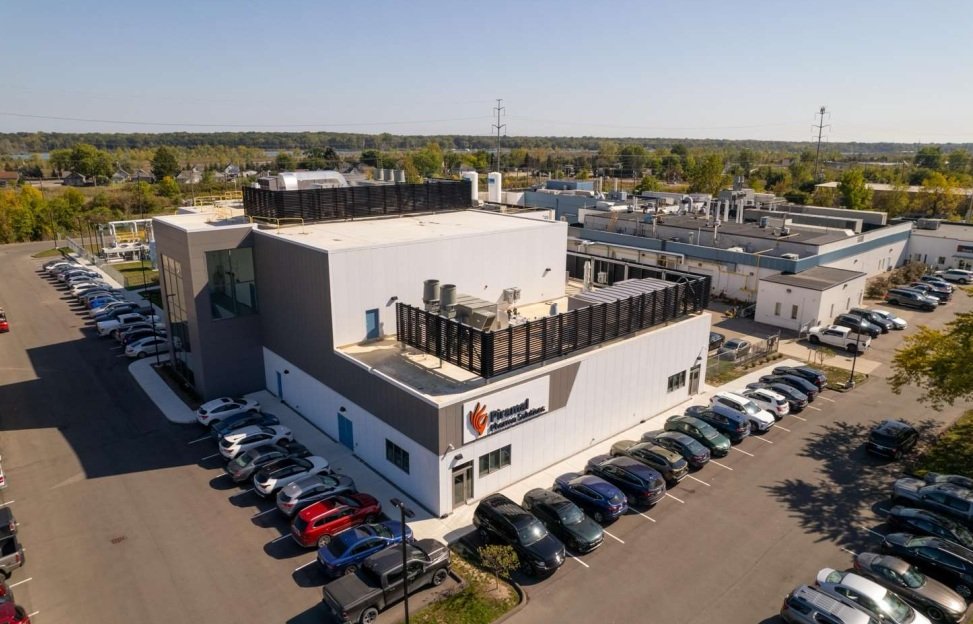Pharma Company Announces Major Expansions at Two US Drug Manufacturing Sites
Rendering of the new Lexington sterile fill/finish facility. All images: Courtesy of Piramal Pharma Limited
Mumbai-based pharmaceutical and wellness company Piramal Pharma Limited has announced a $90 million investment to expand two of its US-based drug manufacturing facilities. Announced during the 2025 SelectUSA Investment Summit, this move supports the growing trend toward onshoring pharmaceutical supply chains and reinforces Piramal Pharma’s commitment to US-based innovation and manufacturing.
The investment includes brownfield expansions—additions to existing sites—which offer a faster, more economical, and lower-risk approach to increasing capacity. The expansions, financed through a combination of internal accruals and bank loans, will enhance Piramal Pharma’s capabilities in both sterile drug product manufacturing and high potency API production. Staff members will be added in both locations, and all new hires will benefit from both internal and external training resources.
“Brownfield expansions were chosen for a number of factors,” Peter DeYoung, CEO of Piramal Global Pharma, told Lab Design News. “First off, both sites already have many years of in-house expertise in these capabilities, as well as experienced work forces, which allows us to become operational more quickly and efficiently and with lower risk than what is inherent when building new facilities and onboarding brand new teams. The second reason is finance; brownfield expansions are the most economical way to add capacity in the US market.”
Peter DeYoung, CEO of Piramal Global Pharma
At its Lexington, KY site, Piramal Pharma will add 24,000 sf of manufacturing space, including a new laboratory and commercial-scale infrastructure to support the production of sterile injectable drug products. The Lexington facility currently specializes in sterile compounding, liquid filling, and lyophilization. Key upgrades in the expansion include a new filling line, two large-scale lyophilizers, an external vial washer, and a specialized capping machine. These enhancements are designed to help clients efficiently scale up their injectable therapies. Construction has begun in Lexington, with the expectation that commercial expansion area will be fully operational by late 2027.
In Riverview, MI, Piramal Pharma is augmenting its well-established active pharmaceutical ingredient (API) development site with a new commercial-scale suite dedicated to payload-linker manufacturing. Payload-linkers are a critical component in the development of antibody-drug conjugates (ADCs), a rapidly advancing category of bioconjugate oncology therapies. With more than five decades of experience in high potency APIs (HPAPIs), the Riverview site will now play a central role in the company’s integrated approach to ADC development. The new payload-linker suite is expected to be operational before the end of 2025.
“Payload-linkers are integral step in the development of bioconjugate drugs for oncology and other indications. Riverview is widely regarded in the CDMO market for its legacy in oncology and with this expansion, Piramal has more capacity to support the growth and maintain its reputation as a leader in drug substances for oncology,” says DeYoung. “In terms of differentiation, Piramal is one of the very few CDMOs that can offer fully integrated ADC solutions, from the initial stages (fragments, peptide fragments, and monoclonal antibodies) through payload-linkers, conjugations, and fill/finish. This is our ADCelerate™ model: accelerated and fully integrated ADC services, all from a single CDMO.”
Riverview site, expansion building featured at left.
Both expansions are key to advancing ADCelerate™, Piramal Pharma’s branded program for integrated ADC development and manufacturing. By combining expertise in monoclonal antibodies, payload-linkers, bioconjugation, and sterile fill/finish, ADCelerate offers clients an accelerated path from project start to GMP drug product in as little as 12 months—without compromising on quality.
“The client base spans the industry, from emerging biopharma companies to mid-size and large multinational innovator companies. Relationships will be expanded based on the ability to do commercial-scale production,” says DeYoung. As for therapeutic areas, ADCs are most commonly used in oncology, but are also being investigated for use in treating autoimmune diseases, neurological disorders, and infections.”
These expansions reflect broader industry trends aimed at strengthening the pharmaceutical supply chain and meeting growing demand for complex therapeutics. By increasing capacity in sterile manufacturing and bioconjugate development, the updated facilities will support the production of injectable drugs and next-generation treatments such as antibody-drug conjugates—two areas of increasing importance in drug development.
DeYoung comments, “Onshoring is certainly top of mind, but it’s not the only reason why the expansions are being made in the US. As stated above, existing expertise is one reason why adding to these sites makes sense. So is market size—the US is the largest market Piramal serves. However, it is also worth noting that Piramal recently invested over $60M in upgrading its ADC site in Grangemouth, Scotland. So the emphasis is truly global.”



